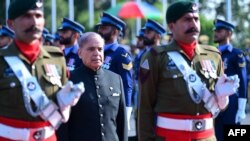Police in Pakistan detained dozens of supporters of jailed former Prime Minister Imran Khan Sunday as they rallied nationwide to protest alleged voter fraud in recent general elections.
Khan’s opposition party, the Pakistan Tehreek-e-Insaf, or PTI, said that the police action occurred in the country’s most populous province of Punjab and disrupted “peaceful” protests there.
Television footage showed security personnel rounding up senior party leaders and workers in the provincial capital, Lahore, and elsewhere in the province. The authorities have not yet explained the charges under which they arrested the protesters.
PTI said in a statement that more than 100 people were taken into custody for demonstrating against “rigging and mandate theft.” It condemned the crackdown and demanded that all detainees be immediately released.
“Staging peaceful protest is a democratic right as per the constitution of Pakistan; however, the imposed government is not willing to have anyone call them out, hence why the arrests, using police as their aides,” the party stated.
The independent Human Rights Commission of Pakistan condemned “the consistent high-handedness of the state in cracking down on PTI protesters” and detaining several of its key leaders during Sunday’s protests against alleged electoral malpractice.
“All citizens, regardless of their political affiliation, have a constitutionally protected right to assemble freely and peacefully. The Punjab government must respect and uphold its political rivals' right to do so if it is to restore people's trust in the state,” the watchdog said on X, formerly known as Twitter.
The February 8 elections for national and provincial parliaments were marred by widespread allegations of rigging and irregularities. Pakistani authorities shut down mobile phone and internet services nationwide on election day and announced the results with an unprecedented delay of almost three days.
The communication blackout and delay gave credence to PTI's claims of electoral fraud and made the elections one of the least credible in the country’s troubled democratic history.
Several countries, including the United States and the European Union, have called for a full investigation into rigging allegations. Pakistani authorities have dismissed foreign criticism of the election, saying it was free and fair.
The vote delivered a split mandate, with PTI-backed candidates winning the most seats in the 336-seat National Assembly or the lower house of parliament, but it fell short of a simple majority.
This allowed the two family-run rival parties, former Prime Minister Shehbaz Sharif’s Pakistan Muslim League-Nawaz, or PML-N, and the Pakistan Peoples Party, or PPP, to cobble together a coalition government, enabling Sharif to return to power for a second time.
Khan and his party have promised to continue their protest campaign until the election results are reversed. They allege that the PTI won a two-thirds majority, but the election commission manipulated the outcome to "steal its mandate.” The commission denies the accusations.
On Sunday, PPP co-chairperson Asif Ali Zardari was sworn in as Pakistan’s new president a day after lawmakers elected him to the largely ceremonial constitutional office for a second time.
Zardari, 68, was the joint candidate of the PML-N and the PPP.
Khan, rated as the most popular national politician by public polls, is currently serving lengthy prison terms after having been convicted of corruption, fraudulent marriage, and leaking state secrets in the lead-up to the February 8 elections.
The 71-year-old cricket hero-turned-prime minister was ousted from office in 2022 through a parliamentary vote of no-confidence and has since faced scores of legal challenges. Khan denies wrongdoing and accuses Pakistan’s powerful military of being behind what he dismisses as politically motivated and frivolous charges.
The military denies it meddles in political matters.





